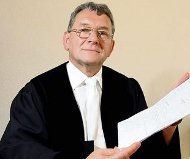Article from: www.thenewspaper.com/news/33/3323.asp
11/15/2010
Germany: Judge Blasts Speed Cameras as Cash Grab
German judge declares speed cameras a rip-off and cancels 42 citations.
 A veteran district court judge in Herford, Germany earlier this month dismissed 42 speed camera citations on the grounds that they were not issued for any legitimate safety purpose. Judge Helmut Knoner blasted the use of cameras that has turned into a multi-billion-dollar worldwide industry.
A veteran district court judge in Herford, Germany earlier this month dismissed 42 speed camera citations on the grounds that they were not issued for any legitimate safety purpose. Judge Helmut Knoner blasted the use of cameras that has turned into a multi-billion-dollar worldwide industry.
"Speed cameras are often a big rip-off," Knoner said. "There is no law that regulates when, where and how measurements are made. For me, the reasonable suspicion is that cities, counties and police authorities only want to make money."
Knoner vowed not to convict anyone based on speed camera evidence until the law changes to provide clear protections for motorists. Existing prosecutions take advantage of statutes designed to fight terrorism and organized crime, not traffic violations. Knoner argued that the state was misapplying the law. As long as a driver remains silent, a photograph is insufficient, absent other evidence, to identify the offender. He added that there was an inherent conflict of interest in having local officials decide where to place cameras considering the amount of money they are able to generate. He said that if the state wants to raise revenue, it should raise taxes, not issue tickets.
"How can I judge whether a speed camera to make money or was set up because of an accident black spot?" Knoner wrote in his ruling. "We need rules on how and where should be photographed and that speed cameras are set up there where it has meaning and purpose."
Knoner has served on the bench for thirty years. Prosecutors are now looking at the possibility of appealing the cases. In an online chat with Stern TV last week, the judge expanded on his reasoning.
"In recent years, the density of monitoring by automated systems and new methods (e.g. laser) has increased significantly," Knoner said. "Now, digital technology watches 24 hours a day, 365 days a year. The situation on the streets alternates between dense traffic and very low-traffic. Monitoring systems do not adapt. If there is any breach it suspects a 'speedster.' Because of the new technology, I think it is possible that the high-volume monitoring will continue to increase, possibly only for financial reasons. This must be stopped."
Knoner emphasized that the procedural rules are put in place to prevent an abuse of power by the state. He explained that it is essential not to allow the government to violate its own rules. He hoped other judges would join in his effort.
"If many judges participate, it will put considerable pressure on the federal government," Knoner said. "The government then will have no choice but to establish clear rules."
 A veteran district court judge in Herford, Germany earlier this month dismissed 42 speed camera citations on the grounds that they were not issued for any legitimate safety purpose. Judge Helmut Knoner blasted the use of cameras that has turned into a multi-billion-dollar worldwide industry.
A veteran district court judge in Herford, Germany earlier this month dismissed 42 speed camera citations on the grounds that they were not issued for any legitimate safety purpose. Judge Helmut Knoner blasted the use of cameras that has turned into a multi-billion-dollar worldwide industry.